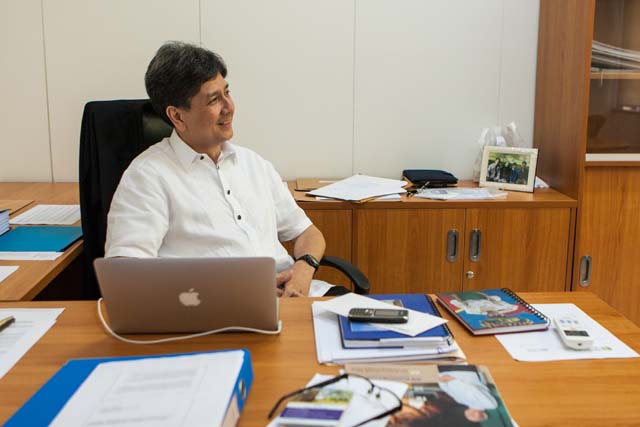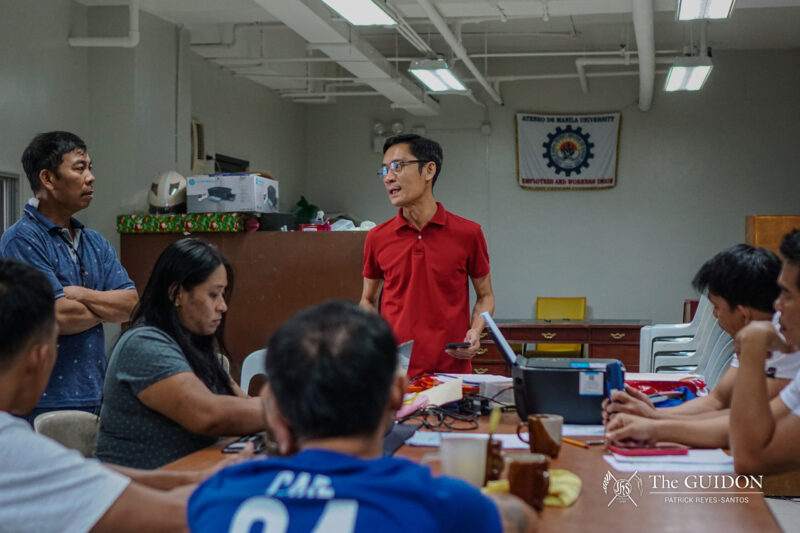
DOVETAILING PLANS. Vice President for Social Development Jamie Hofilena says he will integrate the visions of his office and those of the offices that will work closely with his. Photo by Ryan Y. Racca.
WHILE HIS goal is to follow the strategic plans laid out for him, newly appointed Vice President for Social Development Jaime Hofileña also aims for integration and synergy among offices concerned with his own.
“For both [nation-building and environmental development], my concern is the structural thing. I want to see what structures work best to achieve greater integration of efforts,” he said.
The university’s Social Development Unit, headed by Hofileña, will “direct the university’s efforts to respond to the societal issues and concerns that are covered by the two strategic thrusts of nation-building and environment development,” as stated in a memo released by University President Fr. Jett Villarin, SJ last February 8.
Hofileña will particularly work with the Ateneo Center for Educational Development (ACED), Gawad Kalinga (GK)-Ateneo, Pathways to Higher Education, the Ateneo Grade School, the Ateneo High School, the Office for Social Concern and Involvement and the Office of the Associate Dean for Student Affairs.
A practicing lawyer since 1990, Hofileña finished his undergraduate degree in philosophy in the Loyola Schools in 1982 and graduated as class valedictorian. He took up his bachelor of laws in the University of the Philippines, where he became class salutatorian in 1989.
Plans for LS
Hofileña noted that there are already a lot of social development initiatives going on in the Loyola Schools, especially those which are student-led. He specifically mentioned the efforts of Alay ni Ignacio, the Council of Organizations of the Ateneo and the Sanggunian, among others.
With the many offices and organizations involved in social development initiatives, Hofileña said that he would be meeting with them “precisely with the intention of dovetailing their plans with his office.”
Sanggunian President Gio Alejo said that some members of the Sanggunian have already met with Hofileña. The former said that the Sanggunian is willing to help the latter in his initiatives.
Alejo also hopes that Hofileña’s office would help in the initiatives of the Sanggunian when the time comes.
Dual role
Hofileña specified two roles he will be playing. His first role is to head the ACED, GK-Ateneo and Pathways to Higher Education. The second role, he said, is more functional.
“The other role is to direct the efforts in terms of carrying out the nation-building and environment development thrusts of the university,” he said.
“The carrying out of that function entails my having to liaise and coordinate with various people and various units in the basic administrative and academic units of the university.”
In terms of formation, however, Hofileña said that his role is indirect. “In the Loyola Schools, there is a definite program of education and formation,” he said.
He noted that as he is not a faculty member of the Loyola Schools, he does not have a direct role in pushing for formation within the context of the academic curriculum.
With formation programs already in place, though, Hofileña said that his role is to review them and to propose possible modifications that will make these programs more faithful to the two thrusts.
Having a stand
In line with greater integration between the Social Development Unit and the other offices and academic units, Hofileña said that he would also like to look at how best to coordinate with the Professional Schools.
Under the nation-building thrust are the efforts of the Ateneo School of Government in the “transformation of governance and politics,” Hofileña said.
He said that there should also be an effort to look into how Ateneans can be catalysts in the transformation of national politics. “If need be, make comments. Articulate the university’s stand on certain seminal issues of national character.”
Another priority, Hofileña said, is establishing a capability of the university to be a “fact-verifier.”
“I think it’s something which is very specific that we can try to achieve,” he said. While he admits that it is not an original idea, he said that he feels drawn to it.
In addition, Hofileña articulated his stand on environment-related concerns the university needs to address. “There’s a talk about a campus master plan, [and] other plans including traffic management,” he said.
“There’s [also] talk of trying to rationalize parking so we can recover green spaces on campus. That would have with it some consequences: people being ready to walk, to ride bicycles,” he adds.
With regard to the thrust of environment and development, Hofileña echoed Villarin’s sentiments. “We should first show that it is capable of being done in our own backyard.”







